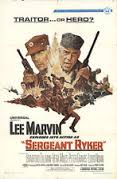
SERGEANT RYKER
US, 1968, 85 minutes, Colour.
Lee Marvin, Bradford Dillman, Vera Miles, Peter Graves, Lloyd Nolan, Murray Hamilton.
Directed by Buzz Kulik.
Sergeant Ryker is an early telemovie from the late '60s. It was given cinema release outside the United States.
Made during the Vietnam war, it has its setting in the Korean war. It is highly patriotic, yet it is critical of American militarism and the victimisation of the American soldier. Basically, it is a court-martial drama and quite an interesting one.
Lee Marvin is persuasive in the central role, a sergeant accused of deserting and defecting to the communist Chinese while claiming that he was on an undercover mission. Bradford Dillman is quite credible as the prosecuting attorney, attracted by Ryker's wife (Vera Miles) and making a plea for a retrial. He becomes Ryker's defence attorney. There is a strong supporting case including Murray Hamilton, Peter Graves, Lloyd Nolan and Norman Fell.
The film was directed by Buzz Kulik who had a mixed career in telemovies and cinema movies. A film of America's past, it is nevertheless interesting for its critical approach to American might and heroism.
1. Interesting telemovie? Americans at war? The military? Patriotism? Disloyalty and treason? The legal processes?
2. The atmosphere of the '50s, Korea and Japan, the atmosphere of the Korean war? Musical score and background?
3. The title and the focus on Sergeant Ryker? Lee Marvin and his credible presence? Audiences sympathetic towards him or not? The ambiguity of the ending?
4. Marvin as the ordinary American sergeant? His World War Two heroism? Inability to fit into the post-war world? Marriage to Anne, drifting, the breakdown of the marriage? Re-enlistment? His education, the revelation that he had roomed with the Chinese general? Presumptions of guilt? His work in the war, Colonel Chambers and the possibility of a secret mission? The lack of evidence? His going behind enemy lines, false information, friendship with the general, being made a Chinese major, present at American servicemen's interrogations? His return? The trial, the general condemnation? The arrival of his wife, the brittle relationship, suspicions of Young, anger at the relationship? His fears, condemnation to death? The possibility of retrial, collaboration with Young, not giving him information, behaviour during the trial? His anger, not wanting to go on the stand? His telling his story, its plausibility? The cross-examination and his angry outbursts, the condemnation of the military and elitism, seeing himself as victim? His being judged not guilty? A future with Anne? Young's comment that only Chambers and Ryker knew the truth?
5. David Young and his career in the military, the prosecution of Ryker and his success? The acclaim of the major, of Appleton? The encounter with Anne, attracted to her, believing her story, his going to General Bailey with the request, standing his ground? The discussions with the other authorities and their refusal? The sergeant and the search for Chambers' body, digging up the grave? The hostility of the officers, General Bailey discovering him with Anne and threatening court-martial? The shunning? Appleton and his continued friendship, homespun advice? The dilemma, trying to collaborate with Ryker and get the truth? His disbelief at the story? Using legal means for defending Ryker? His behaviour in the court, his shrewdness and intelligence? Technicalities? The witnesses, the revelation of the truth? Putting Ryker on the stand after the hostility of the court? The outburst? The information from the sergeant, the little black book, the investigation of the Korean girl, Appleton's downfall? The exoneration of Ryker? The final talk with Anne - and his future?
6. Anne, her perspective on the marriage, coming to support her husband, in love with Young? Wanting a retrial, the digging up of the coffin? Caught by General Bailey? In the court, response to her husband, return to him?
7. The military officials and the stances they took, understandable? The major, antagonism towards Young, conduct of the prosecution? The commander of the camp and his insinuations about relationships? Appleton, loyalty to Chambers, homespun wisdom, friendship? The Korean girl? The exposing of his lack of security and his humiliation? The sergeant and his support?
8. General Bailey, the defeats in Korea, the battle of Inchon? Being woken, his firm stance, listening to Young, sense of justice? Catching Young with Anne? Coming to court, his reaction to Appleton's exposure?
9. The interest in court case drama? The interaction of personalities? Clues and evidence? Circumstances? The court-martial and the military implications? Treason?
10. The effectiveness of the drama, the use of flashbacks? The holding of Lee Marvin's appearances till the court sequences and the flashbacks? Insight into American justice?